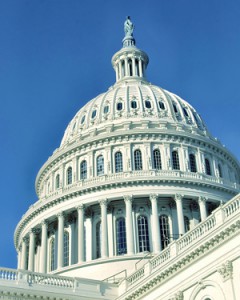Secular Lobby Day Shows Growing Nontheistic Movement

Last week I attended the Secular Coalition for America’s Lobby Day and Secular Values Summit on Capitol Hill. This event is a great opportunity for humanists, atheists, agnostics, and nontheists to come to Congress and make their voices heard on a variety of issues.
It’s also a great opportunity for members of Congress to speak directly to nontheists, as several did during both the Secular Awards Dinner held June 14 at the Newseum and during the lobby training the next day. Attending the dinner were Representatives Jamie Raskin (D-MD), Kyrsten Sinema (D-AZ), Bobby Scott (D-VA), and Jerrold Nadler (D-NY), as well as Senator Sheldon Whitehouse (D-RI), all of whom spoke about the importance of the nontheistic community participating in our political system and fighting back against the religious right.
The most important part of the daylong event was the actual lobbying done by nontheists on Capitol Hill. Nontheists from across the country attended meetings with their respective representatives and senators (all set up by the hard-working staff of the Secular Coalition for America) to discuss two important issues: the repeal of the Johnson Amendment and the introduction of the Do No Harm Act.
As I’ve detailed before, the Johnson Amendment refers to a change in the US tax code in 1954 that prohibited houses of worship and other 501(c)(3) charitable organizations from participating in political campaigns while receiving preferential tax status. If the Johnson Amendment is repealed, political donations to churches, which would eventually be given to candidates or causes, would be tax-deductible, unlike other forms of political giving. Churches and other houses of worship would also then be able to endorse candidates from the pulpit and tie their endorsement to a religious imperative as a way to sway their parishioners, all while keeping their preferential tax status. Finally, donations to churches for political ends would be anonymous, unlike most other forms of political giving. And while most 501(c) groups must file Form 990 tax returns that provide some information about the group and its activities, churches are exempt from that reporting requirement. As a result, their political spending would be nearly impossible to track.
While President Trump recently issued an executive order calling for the non-enforcement of the Johnson Amendment, the law is still on the books until Congress formally repeals it, and the next president can issue an executive order nullifying Trump’s actions on the issue. There are several bills in Congress attempting to repeal the amendment, which the Lobby Day attendees opposed during their in-person meetings with government officials.
The second lobbying priority for this coalition of citizen lobbyists was the Do No Harm Act, which will be reintroduced in the next few weeks. According to the Congressional Research Service, this bill would make the Religious Freedom Restoration Act of 1993 (RFRA) inapplicable to federal laws (or implementations of federal laws) that “protect against discrimination or the promotion of equal opportunity…or provide for access to, information about, referrals for, provision of, or coverage for, any health care item or service.”
Effectively, this bill is intended to end the religious exemptions in federal law that allow individuals to use their religious affiliation as an excuse to discriminate against other Americans, whether it be in a place of business against LGBTQ Americans or even in the provision of reproductive health services to female employees.
By advocating on these issues, secular and nontheistic Americans showed our lawmakers that our community and its legislative priorities can’t be ignored, and that the dominance of the religious right in public policy circles is quickly coming to a close.
